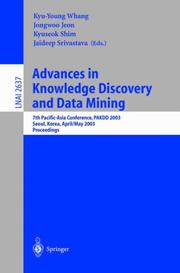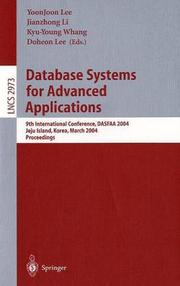| Listing 1 - 3 of 3 |
Sort by
|

ISBN: 3540047603 3540361758 Year: 2003 Publisher: Berlin : Springer,
Abstract | Keywords | Export | Availability | Bookmark
 Loading...
Loading...Choose an application
- Reference Manager
- EndNote
- RefWorks (Direct export to RefWorks)
The 7th Pacific Asia Conference on Knowledge Discovery and Data Mining (PAKDD) was held from April 30 to May 2, 2003 in the Convention and Exhibition Center (COEX), Seoul, Korea. The PAKDD conference is a major forum for academic researchers and industry practitioners in the Pacific Asia region to share original research results and development experiences from different KDD-related areas such as data mining, data warehousing, machine learning, databases, statistics, knowledge acquisition and discovery, data visualization, and knowledge-based systems. The conference was organized by the Advanced Information Technology Research Center (AITrc) at KAIST and the Statistical Research Center for Complex Systems (SRCCS) at Seoul National University. It was sponsored by the Korean Datamining Society (KDMS), the Korea Information Science Society (KISS), the United States Air Force Office of Scientific Research, the Asian Office of Aerospace Research & Development, and KAIST. It was held with cooperation from ACM’s Special Group on Knowledge Dis- very and Data Mining (SIGKDD).
Database management --- Database searching --- Data mining --- Computer Science --- Engineering & Applied Sciences --- Information Technology --- Computer Science (Hardware & Networks) --- Computer science. --- Data structures (Computer science). --- Mathematical statistics. --- Database management. --- Information storage and retrieval. --- Artificial intelligence. --- Computer Science. --- Data Structures, Cryptology and Information Theory. --- Artificial Intelligence (incl. Robotics). --- Probability and Statistics in Computer Science. --- Database Management. --- Information Storage and Retrieval. --- Information Systems Applications (incl. Internet). --- Data structures (Computer scienc. --- Information storage and retrieva. --- Data Structures and Information Theory. --- Artificial Intelligence. --- Information storage and retrieval systems. --- Application software. --- Data base management --- Data services (Database management) --- Database management services --- DBMS (Computer science) --- Generalized data management systems --- Services, Database management --- Systems, Database management --- Systems, Generalized database management --- Electronic data processing --- AI (Artificial intelligence) --- Artificial thinking --- Electronic brains --- Intellectronics --- Intelligence, Artificial --- Intelligent machines --- Machine intelligence --- Thinking, Artificial --- Bionics --- Cognitive science --- Digital computer simulation --- Logic machines --- Machine theory --- Self-organizing systems --- Simulation methods --- Fifth generation computers --- Neural computers --- Application computer programs --- Application computer software --- Applications software --- Apps (Computer software) --- Computer software --- Mathematics --- Statistical inference --- Statistics, Mathematical --- Statistics --- Probabilities --- Sampling (Statistics) --- Information structures (Computer science) --- Structures, Data (Computer science) --- Structures, Information (Computer science) --- File organization (Computer science) --- Abstract data types (Computer science) --- Statistical methods --- Data structures (Computer science)
Dissertation
Year: 1983 Publisher: [United States] Stanford University Press
Abstract | Keywords | Export | Availability | Bookmark
 Loading...
Loading...Choose an application
- Reference Manager
- EndNote
- RefWorks (Direct export to RefWorks)
A new approach to the multifile physical database design is presented. Most previous approaches towards multifile physical database design concentrated on developing cost evaluators for given designs. To accomplish the optimal physical design, however, these approaches had to rely on the designer's intuition or on exhaustive search, which is practically infeasible even for moderate-sized databases. In our approach we develop a theory called separability to partition the entire database design problem into collective subproblems. Straightforward heuristics are employed to incorporate the features that cannot be included in the formal theory. This approach is somewhat formal, deliberately avoiding excessive reliance on heuristics. Our purpose is to render the whole design phase manageable and to facilitate understanding of the underlying mechanisms. We develop a design methodology for relational database systems based on the theory. First, we set up a basic design phase in accordance with a formal method that includes a large subset of practically important join methods and then, using heuristics, extend the design procedure to include other join methods as well. We show that the theory of separability can be applied to network model databases as well. In particular, we show that a large subset of practically important access structures that are available in network model database systems satisfies the conditions for separability. As an application to the above theory, we propose three physical database design algorithms for relational database systems. These algorithms have been fully implemented in the Physical Database Design Optimizer (PhyDDO) in about 6000 lines of Pascal code and tested for their validation. The results show that the solutions generated by the design algorithms do not significantly deviate from the optimal solutions.

ISBN: 1280306939 9786610306930 3540245715 3540210474 Year: 2004 Publisher: Berlin, Heidelberg : Springer Berlin Heidelberg : Imprint: Springer,
Abstract | Keywords | Export | Availability | Bookmark
 Loading...
Loading...Choose an application
- Reference Manager
- EndNote
- RefWorks (Direct export to RefWorks)
The 9th International Conference on Database Systems for Advanced Applications (DASFAA 2004) was held during March 17–19, 2004 on the beautiful Jeju island of Korea. The DASFAA conference provides an international forum for technical discussions among researchers, developers, and users of database - stems from academia, business, and industry. The main focus of DASFAA is on research in database theory, development of advanced DBMS technologies, and their advanced applications. A premier database conference in the Asia/Pacific region, DASFAA has been held every two years, and in many countries in the region. To promote the area further and to answer the needs of many participants, the steering committee decided to hold the conference annually. DASFAA 2004 was the first such annual conference. The conference was organized by the Special Interest Group on Databases (SIGDB) of the Korea Information Science Society and the Advanced Information Technology Research Center (AITrc) at KAIST – an engineering research center of excellence (ERC) supported by the Korea Science and Engineering Foundation (KOSEF). We had a number of sponsors who made generous contributions to make the conference successful. They are Oracle Korea, Samsung SDS, Korea Telecom Data, Inc. , the United States Air Force Office of Scientific Research, the Asian Office of Aerospace Research&Development, the Army Research Office-Far East, and the Korea Advanced Institute of Science and Technology (KAIST).
Computer science. --- Database management. --- Information storage and retrieval systems. --- Information systems. --- Multimedia systems. --- Management information systems. --- Computer Science. --- Database Management. --- Information Storage and Retrieval. --- Information Systems Applications (incl.Internet). --- Multimedia Information Systems. --- Business Information Systems. --- Engineering & Applied Sciences --- Computer Science --- Database management --- Information technology. --- Business --- Information storage and retrieval. --- Multimedia information systems. --- Information Systems Applications (incl. Internet). --- IT in Business. --- Data processing. --- Information storage and retrieva. --- IT (Information technology) --- Technology --- Telematics --- Information superhighway --- Knowledge management --- Computer-based multimedia information systems --- Multimedia computing --- Multimedia information systems --- Multimedia knowledge systems --- Information storage and retrieval systems --- Data base management --- Data services (Database management) --- Database management services --- DBMS (Computer science) --- Generalized data management systems --- Services, Database management --- Systems, Database management --- Systems, Generalized database management --- Electronic data processing --- Automatic data storage --- Automatic information retrieval --- Automation in documentation --- Computer-based information systems --- Data processing systems --- Data storage and retrieval systems --- Discovery systems, Information --- Information discovery systems --- Information processing systems --- Information retrieval systems --- Machine data storage and retrieval --- Mechanized information storage and retrieval systems --- Computer systems --- Electronic information resources --- Data libraries --- Digital libraries --- Information organization --- Information retrieval --- Application software. --- Business—Data processing. --- Application computer programs --- Application computer software --- Applications software --- Apps (Computer software) --- Computer software
| Listing 1 - 3 of 3 |
Sort by
|

 Search
Search Feedback
Feedback About UniCat
About UniCat  Help
Help News
News